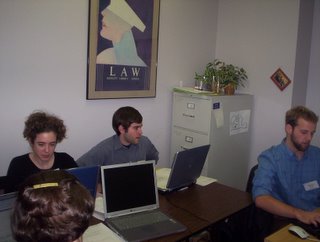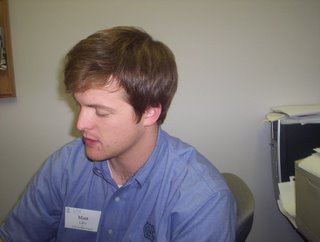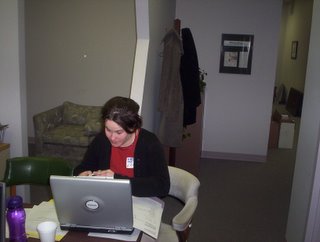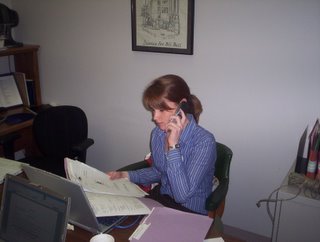Two Drives and More Than Two Sides of the Story
Ellen ordered us off the job early today to experience some of the city in the light, so we drove down Magazine St. into the Garden District. Just like the folks down Canal St. had been poor before Katrina, the area we were in had been well off before the storm and continued to be so afterward. These beautiful plantation homes had some damage, but unlike the morning's drive this one was teeming with life. This area was being repaired by residents and workers alike. Much has been made about the correlation between income and injury with Katrina, but whether that is true i do not know. Could it be that if you were rich you lived on higher ground and were therefore less likely to flood, maybe, but it also could have been the fickled happenstance of mother nature. There was disparity before Katrina, and there certainly is after - but many will just say that is just New Orleans. But personally the stark contrast between our morning and evening drives still gives me a feeling more than sorrow, which does not sit quite right.
Before the trip I heard a relief worker on NPR talking about how she was leaving New Orleans a month early because she felt like some of the neighborhoods were not being touched, and that she thought she was underutilized and underappreciated. From my experience there is some truth in the first half of that statement, but the second a complete falsity.
We have been to a local hole in the wall for lunch the last two days, Mena's Palace. It is a great place much like Sutton's in Chapel Hill or Cooper's Barbeque in Raleigh. I have had a shrimp po-boy and a breaded veal cutlet po-boy, but you really could close your eyes and point to the menu and be sure you would get something good. The place is filled with worn relief workers, hurried professionals, and haggard but friendly waitresses. Today our's immediately said "ya'll aren't from around here are ya?" But then she proceeded to tell us about how where she lived across the river was getting back to normal, but that the city of New Orleans has been much slower to get things cleaned up. It was a very real account from a very real person.
On that same token everyone has a point of view on the hurricane. As we look for physical damage we fast forget that this disaster affected many more people than it did buildings. A city of 800,000 now has 50,000 - and 19 of those are law students who are going home on friday. But more than anything i saw on either drive the effects of the storm are seen in the faces, in the stories and in the actions of the people of New Orleans.
Rachel and Ellen up front told us that you could see that the storm had frazzelled them. As we call attorneys you get a range of people from ticked off to happy to help to holding on by a string. Ellen brought us together and gave us gutwrenching stories in order to dispell some of the myths about the Superdome, the levees, and Katrina. At the Hoffmans' house later saw a slideshow of pictures from a Carolina Alum who weathered the storm inside the city. No matter who you talk to about the storm, the opinions about the causes and happenings change. But the common thread that binds these people to the land they love so much, is that no matter who you talk to the watermarks are showing and the need for them to somehow start over from sqaure 1 shows. Which is why I am so happy that the hardworking ladies of the New Orleans Pro Bono Project are taking a deserved break next week.
But my second issue with the lady from NPR concerns the amount to which the city is actually alive and thankful for any and all who are around. Mother's is open. Burbon Street is open. Pat O'Brien's is open, though with few people and only one bar - which I am told is weird. Handgrenades and muffaletta sandwiches are being consumed, and the people of this area are greatful. They are too greatful; wonderful people like the Goodsons and the Hoffmans and the all the attorneys thank us mightily at every turn, when really we should be thanking them for their generosity. It is hard to feel like you make a dent a problem so big, but the attorneys, the clients, the families, EVERYONE is happy that we are here and we are willing to help. And even more importantly they are hopeful that we will take their stories beyond the bounds of the Bayou.









